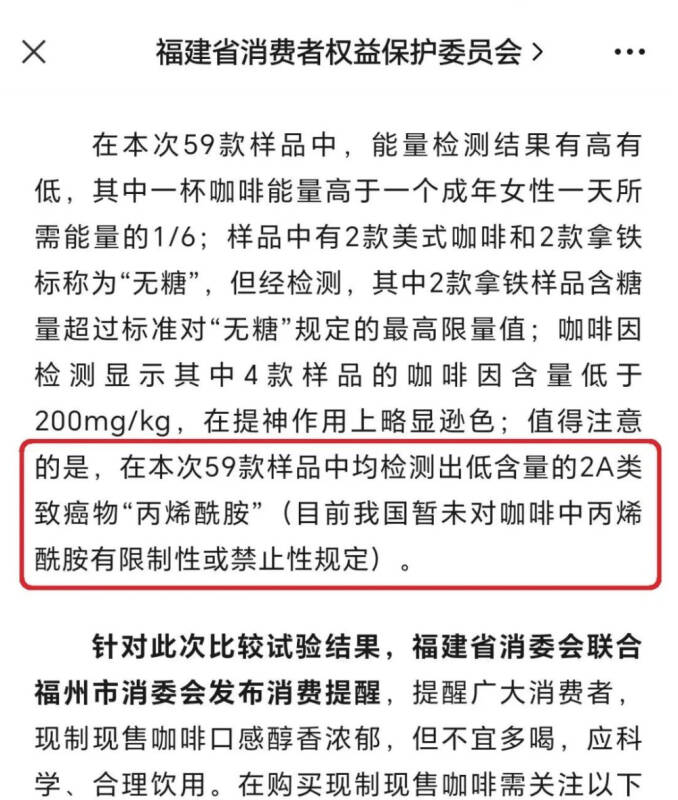Carcinogens were detected in 59 kinds of coffee!?
▲
Click follow | Daily boutique coffee culture magazine coffee workshop
Recently, our coffee has gone back to the pot again!
On December 6, the Fujian Provincial Consumer Rights Protection Commission released the results of the comparison Test and consumption reminders of ready-made Coffee in 2023, saying that it and the Fuzhou Consumer Council had conducted a comparative experiment on 59 types of off-the-shelf coffee from 20 coffee brands in Fuzhou through online and offline orders.

It is reported that the samples in the test involve a number of mainstream brands such as Lucky, Starbucks, Lucky Cafe, Tims, KFC and McDonald's, including American, latte and flavored latte types of coffee, mainly aimed at the sample energy, carbohydrates, protein, fat, trans fatty acids, total sugar, caffeine, acrylamide and other eight items.

Fujian Consumer Council mentioned in the paragraph of the test results, "it is worth noting that low levels of Class 2A carcinogen 'acrylamide' were detected in all 59 samples (currently there are no restrictions or prohibitions on acrylamide in coffee in China.)"
With the integration and spread of multiple self-media views, the news of "carcinogens detected by mainstream coffee brands" was suddenly forwarded to major social platforms, causing a wider discussion. People have questioned whether there are food safety problems with the coffee they have ordered, and even become "vigilant" to the chain brands around them.
The picture shows some sampling samples in the test.
It is nothing new to say that "carcinogens are found in coffee". In 2018, there were many reports about the problem, which was mainly directed at Nestl é, Lucky and Starbucks, and the current "carcinogen detection" covers several mainstream brands on the market, attracting much attention.
So the question is, what exactly is the "acrylamide" that has been identified?
Search shows that acrylamide is an organic compound that can damage the nervous system of the body. In the list of four types of carcinogens published by World Health Organization (WHO), it belongs to Class 2A carcinogens, that is, although it has a clear carcinogenic effect in animal experiments, it has not been concluded in the results of population studies. Many epidemiological studies have shown that acrylamide is associated with kidney cancer, endometrial cancer and head and neck tumors, but these carcinogenicity is only "suspected".
Photo: CCTV News
In fact, coffee beans themselves do not contain acrylamide, nor are they added later, but are produced naturally during roasting. Frying and baking foods containing carbohydrates and proteins at high temperature (more than 120℃) will produce a certain amount of acrylamide while making them scorched, and its release is related to baking temperature and time. In general, the roasting temperature of coffee beans almost goes to more than 200 degrees, so acrylamide must be produced.
In 2005, the expert Committee (JECFA) jointly established by the Food and Agriculture Organization of the United Nations / World Health Organization also mentioned the content of acrylamide in various foods in the paper "the Hazard and Hazard Assessment of acrylamide in Food". It can be seen that in addition to coffee, acrylamide is also found in French fries, biscuits, barbecue and other foods.
As for the amount of cancer, we might as well do a simple calculation first.
According to a 2010 study in the Journal of Food and Chemical Toxicology, the carcinogenic dose of acrylamide is 2.6 to 16 μ g per kilogram of body weight, that is, an adult with about 50kg needs 130 μ g of acrylamide per day to reach the carcinogenic dose.
According to the tweet of Fujian Consumer Council, the content of acrylamide in a cup of coffee is 3.39 μ g-10.2 μ g, and the highest value of 10.2 μ g / cup is calculated. The minimum carcinogenic dose of acrylamide is about 12.74 cups of coffee per day for an adult weighing 50kg. May I ask how many people need to drink 12 cups of coffee every day?
Finally, from the parenthesis statement of the local consumers' association, "(at present, there are no restrictions or prohibitions on acrylamide in coffee in our country.") and in terms of dosage, the local consumers' association should assess the safety of the test results sufficiently, and if there is a real threat to safety, the related products should be removed or recalled. And the local consumers' association is similar to carcinogenic warnings and many media thriller headlines, which is even more frightening.
Disclaimer: some of the pictures in this article come from the network, and some of the contents of the website, such as pictures, we will respect the origin of the original copyright, but due to the large number, there will be individual pictures and texts not in time to indicate, please forgive me. If the original author has any disputes can contact the website to deal with, once verified we will immediately correct, by the "coffee workshop" collation and editing, reprint please indicate, if infringement, please inform deletion, thank you ~!
Important Notice :
前街咖啡 FrontStreet Coffee has moved to new addredd:
FrontStreet Coffee Address: 315,Donghua East Road,GuangZhou
Tel:020 38364473
- Prev

It's gone forever! Nostalgic for the era of Starbucks handwriting Cup
▲ Click to follow | Daily boutique Coffee Culture Magazine Coffee Workshop "Hello, I'm Azure Dragon left and right White Tiger, is my coffee ready?" Friends who often buy coffee at Starbucks must be very familiar with this scene, this is not a joke between friends, but at the Starbucks table to the password scene. Except for this.
- Next

How many ways are implied in the leak-proof packaging of coffee takeout?
▲ Click to follow | Daily boutique Coffee Culture Magazine Coffee Workshop with the gradual maturity of the takeout market, no matter at home, in the company, or outdoors, as long as you open the takeout platform to order food, riders will deliver the coffee to us. In the whole process from the merchant serving to the rider delivering the meal, outside
Related
- What grade does Jamaica Blue Mountain No. 1 coffee belong to and how to drink it better? What is the highest grade of Blue Mountain coffee for coffee aristocrats?
- What are the flavor characteristics of the world-famous coffee Blue Mountain No. 1 Golden Mantelin? What are the characteristics of deep-roasted bitter coffee?
- Can I make coffee a second time in an Italian hand-brewed mocha pot? Why can't coffee be brewed several times like tea leaves?
- Hand-brewed coffee flows with a knife and a tornado. How to brew it? What is the proportion of grinding water and water temperature divided into?
- What is the difference between Indonesian Sumatra Mantinin coffee and gold Mantinin? How to distinguish between real and fake golden Mantelin coffee?
- What does bypass mean in coffee? Why can hand-brewed coffee and water make it better?
- Unexpected! Ruixing Telunsu lattes use a smoothie machine to foam milk?!
- % Arabia's first store in Henan opens into the village?! Netizen: Thought it was P's
- Does an authentic standard mocha coffee recipe use chocolate sauce or powder? Mocha Latte/Dirty Coffee/Salty Mocha Coffee Recipe Share!
- What is the difference between Vietnam egg coffee and Norway egg coffee? Hand-brewed single product coffee filter paper filter cloth filter flat solution!

